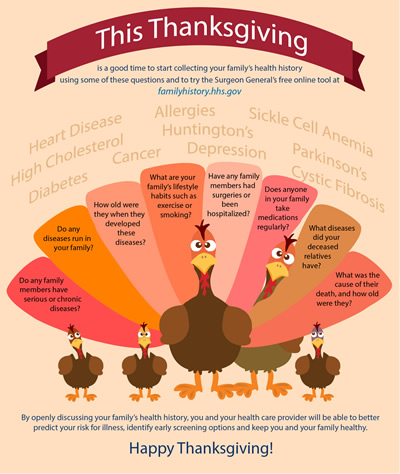Last updated: November 24, 2014
This Thanksgiving, celebrate National Family Health History Day
This Thanksgiving, celebrate National Family Health History Day
By Raymond MacDougall
Associate Director of Communications, Division of Intramural Research
 |
Since 2004, the U.S. Surgeon General has declared Thanksgiving as National Family Health History Day. Rear Admiral Boris D. Lushniak, M.D., M.P.H., the acting U.S. Surgeon General, is upholding this proud tradition by encouraging Americans to talk about their family health histories at this year's holiday gatherings, and make a record of their inherited health conditions.
To make it easy for members of the public to construct family health histories, the National Human Genome Research Institute (NHGRI) and the Office of the Surgeon General developed My Family Health Portrait. This online tool - created for the first National Family Health History Day and updated several times since - assembles family health information in a format that can be printed and shared.
"Getting started may be the biggest hurdle in building a family health history," said Laura Lyman Rodriguez, Ph.D., director of NHGRI's Division of Policy, Communications and Education. "Ease of use is a prominent feature of the My Family Health Portrait tool."
Ideally, a family health history should contain health information about at least three generations, listing the diseases and conditions that have affected family members, the age a disease was diagnosed and, in the case of deceased family members, the cause of death. The most important relatives to include are parents, siblings and children. Combinations of diseases within a family should be noted, like heart disease and diabetes, or breast and ovarian cancer. Knowing that a particular disease is prevalent in a family's health history can help healthcare providers assess risk and guide health strategies.
Washington and West Virginia communities test Family Health Portrait tool
In addition to working to continually enhance the My Family Health Portrait tool, NHGRI's Education and Community Involvement Branch and the Genomic Healthcare Branch recently sponsored two public health projects to evaluate the use of the tool in Washington state and West Virginia. Both branches are part of the NHGRI Division of Policy, Communications and Education.
The University of Washington's Partnership for Native Health collaborated with a tribal clinic and an urban health clinic to evaluate both the tool and a recently developed module focused on colorectal cancer risk. Colorectal cancer is a leading cause of cancer mortality among American Indian and Alaska Native people, with the high incidence attributable, in part, to low cancer screening rates.
Participants completed the online heath history and the colorectal module and received a follow-up colorectal cancer risk assessment letter. Many participants found the letter useful in starting conversations about health issues with family, community members and healthcare providers.
Healthcare providers in the clinics were enthusiastic about the tool and said that it should be integrated into tribal and urban clinics through a patient registration process or other standard format. They also suggested developing other risk assessment tools that would be valuable within My Family Health Portrait for conditions such as substance abuse, mental health and diabetes.
In another project, the West Virginia Prevention Research Center at West Virginia University tested the health history tool and a new module to assess diabetes risk in a rural community. Researchers wanted to see if using the tool improved community members' knowledge of diabetes risk and empowered them to make lifestyle improvements.
West Virginia ranks among the highest out of all the states for the incidence of diabetes, depression and obesity. Lifestyle factors such as smoking, physical inactivity and poor nutrition have contributed to a greater prevalence of coronary artery disease, hypertension, diabetes, stroke and obesity in this state. Eliminating these chronic risk factors could prevent 80 percent of heart disease and stroke, 80 percent of diabetes and 40 percent of cancers, according to the Centers for Disease Control and Prevention. The majority of the West Virginian participants (90 percent) said that completing their family health history helped them understand their risk for diabetes and motivated them to make changes to reduce their risk.
Jean Jenkins, Ph.D., clinical advisor in NHGRI's Genomic Healthcare Branch, said that in the future, genetic tests will make it possible to identify the specific glitches in genes that may increase disease susceptibility. In the meantime, family health histories are available to almost everyone and can provide important clues about disease risk.
"Becoming aware of our family health history is an important step in motivating healthy behaviors that reduce risk for chronic health conditions present in our families," Dr. Jenkins said. "We can learn a great deal during the holidays from those who are closely related to us. Once gathered, the family history can be shared and used by your healthcare provider to help inform personalized decisions about your healthcare."
Posted: November 24, 2014
